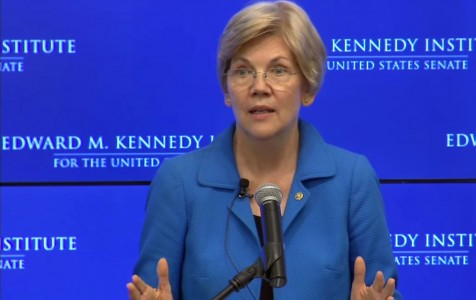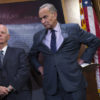Commentary — As you can seen from the Washington Post article below, Senator Elizabeth Warren has volunteered to become the white face for the political science fiction put out by the Black Lives Matters organization. In this narrative, blacks fear for their lives due to systematic violence against them from white police and vigilantes, simply due to white racism against them. “Hands up, don’t shoot!”
People can debate all they want about the difficulties faced by police in this country versus the level of misconduct within the police force. But what is clear is that to the extent blacks need to fear for their lives, it is from other blacks in their community. What other population in the world, besides those in the state of civil war, lives in such relative affluence compared to the global average yet engages in so much intra-communal violence? Not to mention that violence across racial lines is overwhelmingly black on white.
Yet thanks to the Zio media, a public figure like Warren can peddle a narrative that is completely at odds with the experiences of practically anyone in this country and still be taken seriously. Seriously enough that she is considered the likely choice as a running mate for Joe Biden, should he be the Democratic nominee. She would also be on Bernie Sanders’ short-list. Both men are well into the seventies…
Elizabeth Warren just gave the speech that Black Lives Matter activists have been waiting for
In a Sunday speech on racial inequality, Sen. Elizabeth Warren (D-Mass.) called for broad policing reform — including de-escalation training and body cameras for all police officers — and likened the current Black Lives Matter movement to the civil rights movement that won black Americans the right to vote in the 1960s.
“None of us can ignore what is happening in this country. Not when our black friends, family, neighbors literally fear dying in the streets.” Warren said. “This is the reality all of us must confront, as uncomfortable and ugly as that reality may be. It comes to us to once again affirm that black lives matter, that black citizens matter, that black families matter.”
In the address, a copy of which was provided to The Washington Post prior to her delivery, Warren draws direct parallels between the civil rights movement and the current anti-police-brutality movement, and it sought to link issues on economic inequality with systemic racism. She traces racial economic inequality, citing inequities in the housing system, as well as decrying restrictions to voting rights.
“Economic justice is not — and has never been — sufficient to ensure racial justice. Owning a home won’t stop someone from burning a cross on the front lawn. Admission to a school won’t prevent a beating on the sidewalk outside,” Warren declared. “The tools of oppression were woven together, and the civil rights struggle was fought against that oppression wherever it was found — against violence, against the denial of voting rights and against economic injustice.”
[WATCH: Elizabeth Warren’s full speech on racial inequality]
Warren’s address, delivered at the Edward Kennedy Institute in Boston, was perhaps the most full-throated endorsement to date by a federal lawmaker for the ongoing protest movement, and it drew immediate praise from some of the most visible activists.
“Senator Warren’s speech clearly and powerfully calls into question America’s commitment to black lives by highlighting the role that structural racism has played and continues to play with regard to housing discrimination and voting rights,” said DeRay Mckesson, a prominent activist who said he hopes to meet with Warren to further discuss racial injustice. “And Warren, better than any political leader I’ve yet heard, understands the protests as a matter of life or death — that the American dream has been sustained by an intentional violence and that the uprisings have been the result of years of lived trauma.”
[Black Lives Matter movement finds influencing 2016 contest a challenge]
Born out of the unrest in Ferguson, Mo., after the police shooting of Michael Brown last summer, the current protest movement has upended the efforts of Democratic presidential candidates to reach out to black voters. The three candidates have faced protests and interruptions at some of their campaign events. Both former Maryland governor Martin O’Malley and Sen. Bernie Sanders (I-Vt.) have met with some of the most visible activists, and former secretary of state Hillary Rodham Clinton and Mckesson have agreed to meet soon.
The activists have called for a host of police reform measures, including body cameras, de-escalation training, special prosecutors in cases of police killings and a review of police union contracts.

Sen. Elizabeth Warren (D-Mass) speaks about raising wages during the forum AFL-CIO National Summit (AP Photo/Jose Luis Magana)
“It is a tragedy when any American cannot trust those who have sworn to protect and serve,” Warren said. “This pervasive and persistent distrust isn’t based on myths. It is grounded in the reality of unjustified violence.”
But the topics of police violence and reform have yet to gain significant traction in the Republican primary. In a three-hour debate held earlier this month, the topics weren’t brought up once — by either the moderators or candidates.
[Why Hillary Clinton and her rivals are struggling to grasp Black Lives Matter]
At times, Warren’s speech read as if it could have been authored by the activists themselves — unyielding in its criticism of police violence and even invoking the phrase “hands up, don’t shoot,” a Ferguson rallying cry that conservatives have attacked as a lie because the Justice Department concluded that Michael Brown’s hands were most likely not up in the air when he was shot and killed by Darren Wilson.
“We’ve seen sickening videos of unarmed, black Americans cut down by bullets, choked to death while gasping for air — their lives ended by those who are sworn to protect them. Peaceful, unarmed protesters have been beaten. Journalists have been jailed. And, in some cities, white vigilantes with weapons freely walk the streets,” Warren said. “And it’s not just about law enforcement either. Just look to the terrorism this summer at Emanuel AME Church [in Charleston, S.C.]. We must be honest: 50 years after John Kennedy and Martin Luther King Jr. spoke out, violence against African Americans has not disappeared.”





